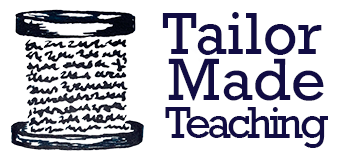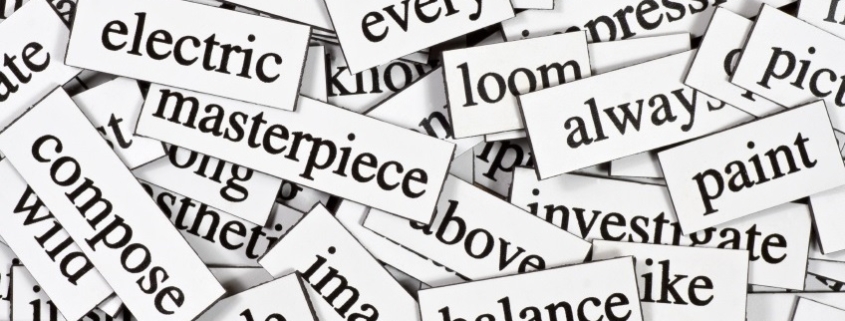
Why Keep a Vocabulary Notebook?
Organised – A note book helps you organise your learning so you can easily locate and review new words.
Personal – You can ensure you are focusing on words which are relevant to your personal interests and areas of study.
Active – Writing down words helps reinforce them in your mind, regular reviews, pictures and diagrams can help fix them in your memory.
How to Start a Vocabulary Notebook
You will need a notebook and coloured pens or pencils. Some students like to use two notebooks, one small to carry around with them to note down new words as you find them and a larger one to organise the words more effectively.
Where to find words?
Most unabridged English dictionaries include over 300,000 words. However, the average 20 year old native English speaker knows around 42,000 words and actively uses around 20,000 of them.
According to some sources, if you know 1.75% of the dictionary, you’ll be able to understand 95% of what you read. Obviously, it depends on which 1.75% of the dictionary you know! So, you can see that it’s really important to select which words you want to learn – picking words at random from a dictionary will be little help.
You should check the meaning of a word in a good dictionary though, don’t just use a translation app.
Which words to record?
You should choose words which are high frequency (appearing more than once), and keywords, in texts you read or listen to.
It’s really useful to learn word families i.e. the same word in different parts of speech (noun, verb, adjective, adverb). Once you understand the base word e.g. ‘Love’, it takes less effort to learn the words derived from it e.g. ‘Lovely’, ‘Loved’, ‘Loving’, ‘Unloved’, in this way you can maximise your learning.
If you want a more systematic approach, the Vocabulary In Use series and the Oxford Word Skills series are good.
What do you need to know about a word?
Your active vocabulary (the words you actually use in speech and writing) will be smaller than your passive vocabulary (the words you can understand in reading or listening), this is normal. In order to really know a word and actively use it you need to know more than its meaning – you need to know how to spell it, how to pronounce it, its part of speech (is it a noun or a verb? etc.), its register (whether it is formal, informal, scientific, academic etc.), the words it collocates with (e.g. do you ‘do’ it or ‘make’ it? Is it usually used with a particular preposition?) and its colligation (the grammatical patterns its used in). You might also want to include a translation, but you shouldn’t rely on translation for most words.
So, to usefully record a word in your notebook, you need to write more than just the word:
Alcoholic (adj.) /ˌælkəˈhɒlɪk/ Containing alcohol. Beer is an alcoholic drink.
Opp. non-alcoholic. Orange juice is a non-alcoholic drink.
Word (part of speech) /Phonemic transcription including word stress/ Definition. Example.
Opposite word. Example.
It will also help you remember if you make your examples personal.
How to Organise your Vocabulary Notebook
Some people like to organise their notebooks alphabetically. However, research suggests it’s more useful to organise it thematically e.g. Food, Family, Crime, Travel, Technology etc., which makes it easier to remember the words and use them appropriately.
It is thought that recording words creatively by using pictures, spidergrams, clines and tables, and making them colourful, can aid memory.
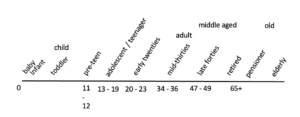
An adjective cline for ages
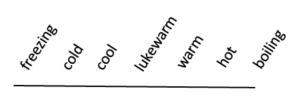
An adjective cline for temperature
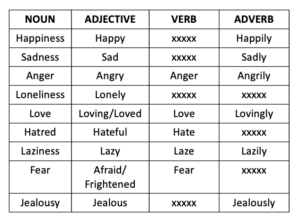
A table with parts of speech for emotions
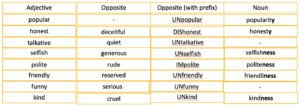
Table of personal quality adjectives and opposites

Sports collocations with go, do and play
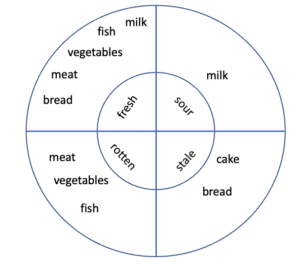
Adjectives related to food
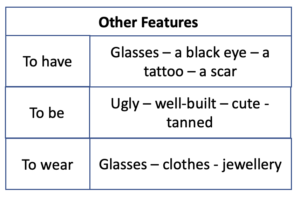
Physical appearance collocations with have, be and wear
Making the Most of Your Vocabulary Notebook
It’s important to update your notebook regularly, perhaps by setting yourself a goal of recording a certain number of words a day or week.
It’s also important to regularly review the words in your notebook. Various studies have suggested that you need to encounter a word 10 to 20 times to fix it in your memory.
Try using your new words in speaking or writing, perhaps by keeping a diary or recording yourself talking about different topics.
